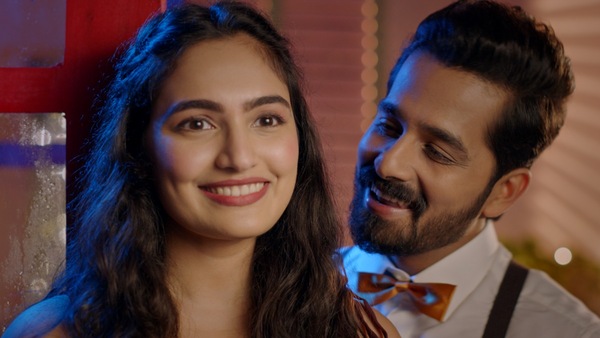Juni movie review – Pruthvi Ambaar and Rishika Naik shine in film that’s realistic, but a tad short on entertainment
Debutant director Vaibhav Mahadev's film takes a deep dive into dissociative identity disorder and more in this love story

Last Updated: 03.47 PM, Feb 08, 2024
Juni movie story: Partha (Pruthvi Ambaar) runs an upscale café, where he’s been trying to create his signature dish for a while, but always finds ‘something’ missing in it. When he then meets Juni (Rishika Naik) a graphic artist, a person with dissociative identity disorder, it sets Partha on a journey of discovery, not only of Juni and the other identities residing in her head, but also of his self.
Juni movie review: Characters with Dissociative identity disorder (DID) or split personality, as it was known earlier, is nothing new in cinema, but as Vaibhav Mahadev, the director of Juni points out, more often than not it would revolve around crime and other bad stuff. Even in the most recent example that comes to mind, Tom Holland’s The Crowded Room, which was loosely based on the real-life case of Billy Milligan, the exploration of his ‘identities’ happens only after a city-centre shooting puts the spotlight on his mental condition at the time.
Like The Crowded Room’s Danny Sullivan, Juni too has other identities with different interests, but with a common goal of protecting her. Vaibhav, who gives himself a cameo to explain the disorder to a shell-shocked and clueless Partha, presents a comprehensive picture of what it means to have split personality and what sets it off. In fact, during an early explanation that DID is a result of childhood trauma – sexual, physical or mental – I was half expecting the filmmaker to then sweep that under the rug and not address it. Vaibhav does address the abuse Juni faced as a child, but the perpetrator’s modus operandi, honestly, did not sound too convincing.
Juni, though, is not all about Juni and her other personalities; it is also about Partha, who comes with emotional baggage. The light of his life went out when his grandmother passed away and he’s been living with parents who, strangely enough, remain together although they seem to have nothing in common apart from him. As much as the film aims to be an eye-opener to DID and that those with the disorder can have normal lives, provided they have people who understand them well around, it is also about learning to not run away from problems and facing them head-on.
Pruthvi Ambaar and Rishika Naik are the foundation and pillars of Juni. He’s got that boyish likeable charm and is earnest as Partha, but it is Rishika who strikes jackpot, armed with a role that requires a range of emotions from her, which she does justice to. To the best of her capabilities, she gives each of Juni’s identities, their own unique personalities that after a point, even the viewer knows who is going to emerge, when and why.
The problem with Juni is that in this whole process, the film feels a tad too academic. It doesn’t take Vaibhav long to put DID on the table, but then he spends too much time on it, so much so that the love story between Juni and Partha becomes a minute embellishment. There’s also not much of a conflict in the story, which prevents the narrative from becoming engrossing.
Juni movie verdict: Juni is a good attempt at presenting a unique perspective to a hitherto little known or misunderstood condition. Pruthvi and Rishika ensure that it is watchable, but at the end of it, one can’t help but feel – ‘If only there was something more’. Like Partha’s PSC, Juni is missing a special ingredient.
Subscribe to our newsletter for top content, delivered fast.

